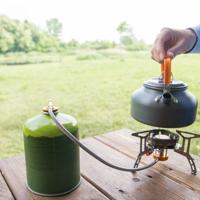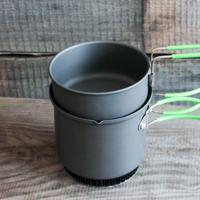Sustainable Camping Gear for Cooking & Dining
A page dedicated to showcasing sustainable cooking and dining gear for camping.
Camping trips often come with the joy of cooking and dining amidst nature. Embracing sustainable practices during this process can enhance your outdoor experience and help protect the environment. This guide delves into sustainable cooking and dining gear, providing practical tips and examples.
Choosing Eco-Friendly Cookware
When selecting camping cookware, look for materials that are durable, lightweight, and sustainably produced. Consider these options:
- Recycled Aluminum: Lightweight and excellent for heat distribution, recycled aluminum cookware reduces waste.
- Stainless Steel: Known for durability and longevity, stainless steel is a great option for minimizing resource consumption.
- Cast Iron: Offers even heat distribution and is endlessly recyclable. While it is heavier, it’s perfect for campers using vehicles.
It’s helpful to research the production practices of manufacturers to ensure they prioritize sustainability. You may find manufacturers committed to eco-friendly methods by consulting resources like the Green American network.
Using Renewable Fuel Sources
Cooking in a sustainable way also means using renewable fuel sources. Here are some alternatives:
- Solar Cookers: Harness the sun’s power to cook your meals without needing fuel.
- Biomass Stoves: Use twigs, wood chips, or other biomass as fuel.
- Alcohol Stoves: While you should use denatured alcohol with caution, it’s renewable and burns clean.
These options can significantly reduce your reliance on non-renewable resources and leave less of an environmental footprint.
Compostable and Reusable Dining Gear
Responsibly managing dining waste is crucial. Invest in:
- Reusable Tableware: Consider stainless steel or bamboo utensils, plates, and cups. They’re lightweight, durable, and reduce disposable waste.
- Compostable Food Containers: If disposables are necessary, opt for compostable food containers made from plant-based materials.
- Cloth Napkins and Towels: Reusable alternatives to paper products that limit waste.
Additionally, always pack out what you bring in and adhere to Leave No Trace principles to minimize environmental impact.
Sustainable Food Storage Options
Preserving food efficiently is another aspect of sustainable camping. Consider these storage solutions:
- Beeswax Wraps: A natural alternative to plastic wrap, these wraps preserve food and reduce plastic waste.
- Silicone Bags and Containers: Reusable and long-lasting, they are perfect for keeping food fresh without single-use plastics.
Ensuring you have proper storage not only reduces waste but also makes meal prep more enjoyable.
Look for Certifications and Labels
Certifications such as Cradle to Cradle, Fair Trade, and USDA Organic can be good indicators of sustainable production practices. These labels provide an extra layer of confidence in the gear and equipment that you choose.
Incorporating these sustainable choices into your camping expeditions not only benefits the environment but also enriches your outdoor adventures. Small changes to your cooking and dining habits can make a significant difference over time. Happy camping!

Eco-Friendly Cookware provides sustainable cooking tools designed for environmentally mindful camping.

Reusable camping utensils help reduce waste and support a sustainable outdoor lifestyle.

Sustainable Food Storage Containers offer durable and environmentally responsible options for outdoor adventures.

A selection of sustainable camping accessories and miscellaneous gear that support a greener outdoor lifestyle.

Solar-Powered Camping Stoves use solar energy to cook meals in an environmentally conscious way.

Biodegradable plates and bowls provide a compostable option that fits naturally into outdoor lifestyles.

Tents & Shelters crafted with sustainability in mind for eco-conscious campers.

Sleeping Gear offers a sustainable approach to staying comfortable under the stars.